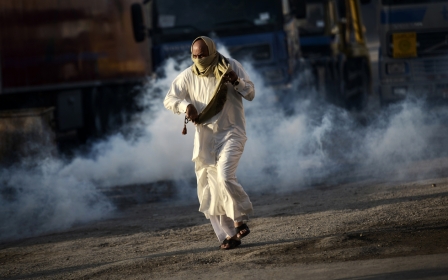Bahrain report admits inmates beaten at notorious 'torture' prison

A Bahrain prison torture inspection panel has been accused of having its "head in the sand" after releasing a report on the notorious Jau prison that failed to address allegations of systematic abuse against inmates or the causes of a mass riot that left hundreds injured.
The Prisoners and Detainees Rights Commission (PDRC) report, released on Wednesday after repeated requests by Middle East Eye, detailed some instances of mistreatment but did not investigate the causes of the riot in March of last year.
The Bahrain Institute for Rights and Democracy (BIRD) group said the commission had taken the government line that inmates had rebelled and refused to follow orders, and only noted that other agencies had investigated "some" claims of mistreatment.
Reports by rights groups claim the violence was sparked by overcrowed, inhumane conditions and that the riot was suppressed with violent, humiliating treatment and torture of prisoners.
The PDRC, which states it "exists to assess the conditions and treatment of detainees and to deter torture", investigated Jau in November 2015, finding that guards had often beaten new inmates on arrival before moving them into overcrowded, poorly maintained and bug-infested cells.
The commission said that almost half the prison's population was inside for "rioting" - a legal term used by the commission to group various crimes ranging from "terrorism" to "blocking roads".
The report said inspectors had found "problems with safety on arrival" at Jau, and that "some prisoners said they did not feel safe or had been assaulted on arrival".
"The prison had discovered some cases of prisoners being physically assaulted and took the necessary legal action about these unacceptable acts," the report said. As a result, several staff members had been sentenced to imprisonment.
It also noted that "staff had not been given any proper training on the lawful use of force in a prison".
Inspectors said that prison staff were not required to record, document or justify their actions and inmates rarely lodged complaints because they felt intimidated and knew they would never be told of the results, if any.
"Not all places were covered by CCTV cameras to deter any abuses," the commission reported, adding it could "therefore not examine evidence to provide assurance of the legal and proportionate use of force".
Of the riots on 10 March, the PDRC said it did not "investigate those incidents itself", and was instead informed by other government agencies, including the interior ministry.
Sayed al-Wadaei, BIRD's director of advocacy, said the failure to investigate the cause of the riots was a "black mark" against the PDRC's findings.
"The PDRC took the Ministry of Interior's narrative without question, and there is no indication that they talked to any of the hundreds of inmates humiliated and tortured last year about their experiences," he said.
"The PDRC have their head in the sand when it comes to torture."
BIRD published its own report last year, Inside Jau, which detailed a list of allegations against authorities at the prison, including humiliating and degrading treatment, depravation of sleep and denial of food, beatings and forced disappearances.
Wadaei said his organisation made three recommendations to the PDRC, but only one was even partially implemented.
The commission's report was, however, critical of some conditions at Jau. It said the prison was 15 percent over capacity at almost 2,500 inmates, who had little access to medical care, comfort and protection from abuse.
In spite of the history of rioting at Jau, it said evacuation procedures and the maintenance of fire and emergency equipment was "not good enough".
It noted that some cell blocks "were in poor condition and had bad hygiene... insect infestations in some rooms, broken toilets and poor cleanliness", especially in older units.
There was no permanent ambulance, paramedic or consultant at the jail, and the only permanent medical staff was a psychiatrist who visited twice a week.
Extra mattresses had been placed on the floors of many cells amid overcrowding, and solitary confinement was "not in an adequate condition".
The PDRC was set up after a 2012 uprising and is part-funded by the UK, which spends $3.1m on guard training and improving human rights in Bahrain's prison system.
Senior officers from Bahrain were flown to Northern Ireland in January to visit three jails as part of a training project.
The report set out nine recommendations to solve its criticisms of the prison, located just south of the capital Manama.
Eight were being implemented or were "ongoing", it said, while the ninth, concerning medical provisions, was pending as the Ministry of Health was currently "taking full control of all medical care".
The Bahrain embassy in the UK did not respond to requests for comment by MEE.
Stay informed with MEE's newsletters
Sign up to get the latest alerts, insights and analysis, starting with Turkey Unpacked
Middle East Eye delivers independent and unrivalled coverage and analysis of the Middle East, North Africa and beyond. To learn more about republishing this content and the associated fees, please fill out this form. More about MEE can be found here.




